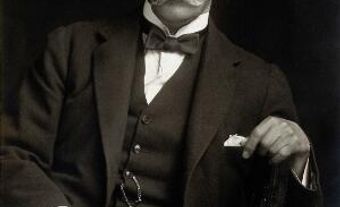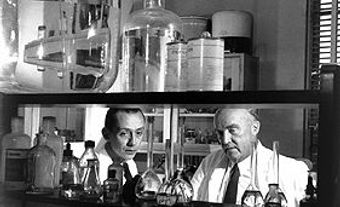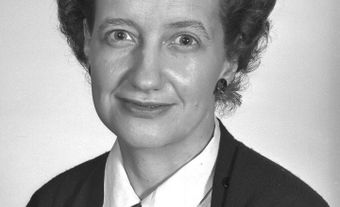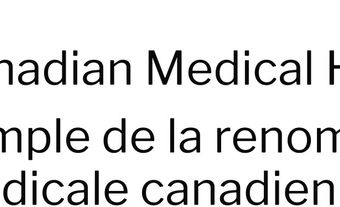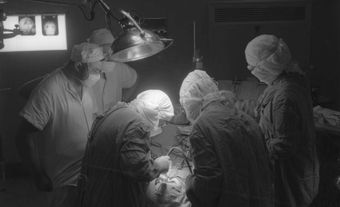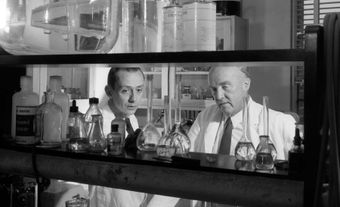Wilder Graves Penfield, OM, CC, FRS, FRSC neurosurgeon, scientist (born 26 January 1891 in Spokane, Washington; died 5 April 1976 in Montreal, QC). Dr. Penfield was the founder and first director of the Montreal Neurological Institute and established the "Montreal procedure" for the surgical treatment of epilepsy. (See also Neuroscience.)

Education and Early Career
Having obtained a BLitt from Princeton University in 1913, Wilder Penfield attended Merton College at the University of Oxford. There he was influenced by two great medical teachers, Sir William Osler, who became his lifelong hero, and the eminent neurophysiologist Charles Sherrington, who introduced him to experimental investigation of the nervous system. After graduating with an MD from Johns Hopkins University in 1918, he served as surgeon to the Presbyterian Hospital (affiliated with Columbia University) and to the New York Neurological Institute 1921-22.
His studies in 1924 with the Madrid neurohistologist Pio del Rio-Hortega provided him with metallic staining techniques that yielded new information on the glia, the supporting cells of the nervous system. In 1928 he learned from the German surgeon Otfrid Foerster the method of excising brain scars to relieve focal epilepsy. That year he moved with his neurosurgical partner, William Vernon Cone, to work at Montreal's Royal Victoria Hospital, where they became associated with neurologist Colin K. Russel.
Montreal Neurological Institute
In 1934, supported by the Rockefeller Foundation, the government of Quebec, the city of Montreal and private donors, Wilder Penfield founded the Montreal Neurological Institute, which rapidly became an international centre for teaching, research and treatment related to diseases of the nervous system. He was its director until 1960. (See also Neuroscience.)

Research and Key Discoveries
Epilepsy became Penfield's great inspiration. His surgical studies yielded reports on brain tumours, the pial circulation, the mechanisms of headache, the localization of motor, sensory and speech functions, and the role of the hippocampus in memory mechanisms. ( See also Brenda Milner.) Epilepsy arising in the temporal lobe of the brain assumed special importance because of the re-excitation of past experiences that occurred when the cortex was stimulated during surgery. Some of the modern theories of separable function of the two cerebral hemispheres were built upon his findings. His concept of centrencephalic seizures arising from deep midline portions of the brain had an important impact on the understanding of the relationship between the brain's structures and consciousness. Penfield's work brought him many high honours both within Canada and abroad. His scientific papers and the handbooks and monographs he wrote with associates became standard reference works on the function of the human brain. (See also Neuroscience.)
Later Career
In the last 15 years of his life Wilder Penfield enjoyed a second career as a writer of historical novels and medical biography. He devoted himself to public service, particularly in support of university education, and became first president of the Vanier Institute of the Family. He was widely known for promoting early second-language training. His writings from this period include The Mystery of the Mind (1975), summarizing his views on the mind/brain problem, and No Man Alone (1977), an autobiography of the years 1891-1934, which was published posthumously.
Legacy
In 1988, Wilder Penfield was designated a National Historic Person by the Government of Canada for his role in establishing the Montreal Neurological Institute and for his groundbreaking work in neurosurgery and neurology (see Neuroscience). Named in honour of Penfield, the first Prix Wilder-Penfield, was awarded by Government of Quebec in 1993 (see Prix du Québec). The prestigious award recognizes winners for their contributions to biomedical research.
Penfield's most lasting legacy was the foundation and the establishment by endowment of the Montreal Neurological Institute. This neurological hospital integrated with a brain-research complex continues to provide a centre where both basic scientists and physicians study the brain; it has served as a model for similar units throughout the world. To Penfield the brain and the nervous system represented the most important unexplored field in the whole of science. "The problem of neurology," he wrote,"is to understand man himself."
Honours and Awards
- Fellow, Royal Society of Canada (1935)
- Fellow, Royal Society (1943)
- Flavelle Medal, Royal Society of Canada (1951)
- Order of Merit (1953)
- Lister Medal, Royal College of Surgeons of England (1960)
- Companion, Order of Canada (1967)
- Royal Bank Award, Royal Bank of Canada (1967)
- Inductee, Canadian Science and Engineering Hall of Fame (1992)
- Inductee, Canadian Medical Hall of Fame (1994)

 Share on Facebook
Share on Facebook Share on X
Share on X Share by Email
Share by Email Share on Google Classroom
Share on Google Classroom


